IANN organized workshop on “Training of Trainers for Facility Based Neonatal Nursing (FBNN) and Quality improvement” at National Institute of Nursing Education from 5th March 2019- 8th March 2019. Total participants were 32 (27 master trainer and 5 observers) and total facilitators (Nurses + doctors) were 10.
The activity started after inaugural ceremony. Chief guest was Dr Praveen and he highlighted the importance of Facility Based Neonatal Nursing in reducing neonatal mortality. He emphasized the need of quality improvement and evidence based care practice to solve the clinical problems encountered on day to day basis. He encouraged the participants to take small projects to improve quality care in their area of work. He emphasized the role of Indian Association of Neonatal Nurses (IANN) in capacity building of neonatal nurses.
All master trainers were given the learners guide on “Newborn Nursing for facility based care in level II units” 3rd edition along with soft copy. They were shown how to conduct participatory module based teaching learning using the book which has 9 modules on essential and level II newborn care. Various teaching learning methodologies were used such as self reading, skill demonstrations, role plays, oral drills, video demonstrations, poster discussions, self evaluation and giving feedback. To elaborate on the above 3 modules were discussed in detail – temperature regulation, KMC and feeding of LBW.
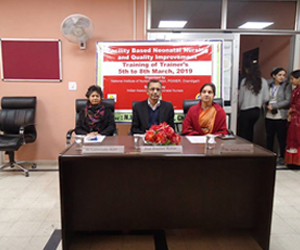
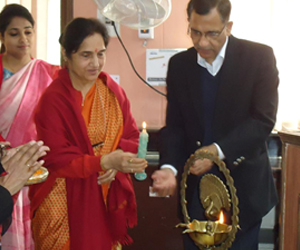
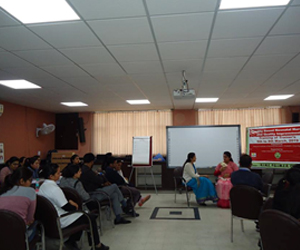
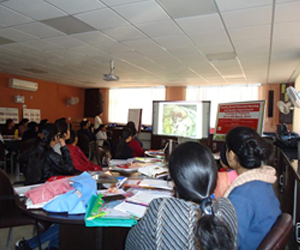
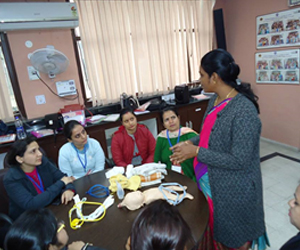
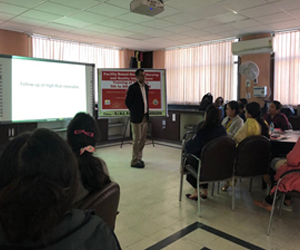
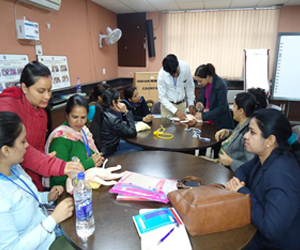

The master trainers were trained in standard treatment protocols for management of common newborn conditions at small hospitals. These protocols are flow chart based and available as a STP calendar and also as an android app developed by AIIMS WHO CC and downloadable form play store of any android phone. The teaching methodology included small group discussions, case scenarios, skill demonstrations, video podcasts on common equipment and OSCE using simulators, wall charts, and apps on tablets. The common conditions discussed were triaging, hypothermia, hyperthermia, feeding of LBW, post asphyxia management, hypoglycemia, shock, neonatal seizures, jaundice and discharge counselling. A glimpse of various equipment podcasts was also shown. The teaching was done by 5 facilitators to three groups of participants. The participants were given the STP calendar and also were guided to download the app on their mobile phones. The soft copy of calendars was shared with participants.
An introduction to Facility base care of preterm infant, eliminating retinopathy of prematurity by improving quality care was given. After this quality improvement tools and techniques were taught. Online introduction to IANN website was given and participants were encouraged to earn certificate of POQCI form the link provided there.
It was followed by brief presentation on how to conduct a QI project – identify a problem, make a SMART aim, analyze the root cause and develop an intervention that can be tested by PDSA using QI tools.
Three groups formed in such a manner that participants from the same Institution/ department were in the same group and were then facilitated to develop a QI project which they presented and agreed that they would conduct the same project in their institutes. The workshop ended with vote of thanks, distribution of certificate and distribution of learning modules, STP wall charts as demanded by the groups.
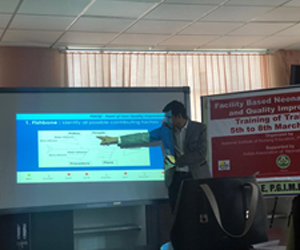
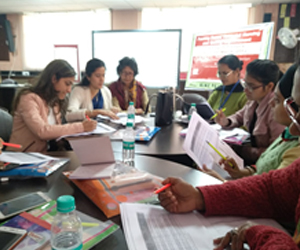
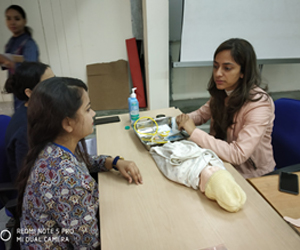

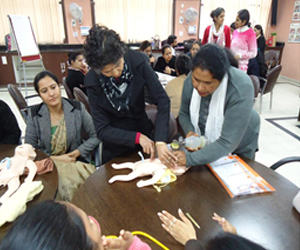
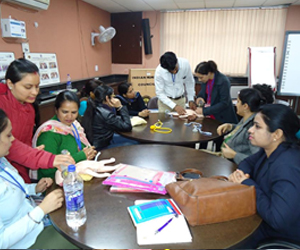
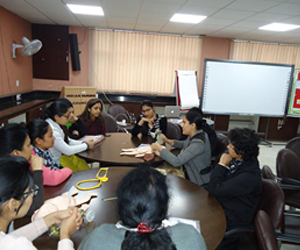
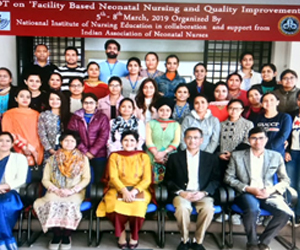
Last day was designated to neonatal resuscitation as this is the core of facility based care. In the morning half sessions were taken on overview and introduction to NRP, initial steps of NEP, PPV, Chest compression, endotracheal intubation and medication. In the evening half hands on skill station were organized and each participant performed the skill. They were made to practice till they performed correctly.
The whole program was an integration of all the three domains of education that’s cognitive, affective and psychomotor. The program ended with valedictory function and certificate distribution. All the participants learned a lot and found the training very interesting and fruitful for upgrading their clinical knowledge and skills.
M.M College of Nursing, Mullana, Ambala in collaboration with Indian Association of Neonatal Nurses (IANN) through technical support of National Collaborative Centre Organized Training of Trainers (TOT) on “Facility Based Newborn Care” from 22nd to 25th January 2019. The eminent neonatologist Dr. Sushma Nangia, Dr. Inderpreet sohi, Dr. Mala Kumar, Dr. Shristi Kumar, Dr. Sadhana Mehta were the resource persons. The course included were NRP Training, and FBNC modules ( hypothermia, neonatal jaundice, neonatal shock etc).
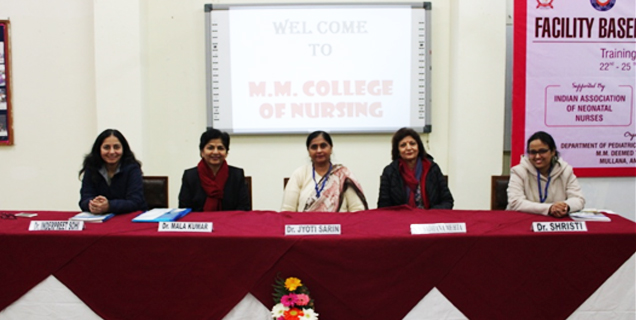
The day one started with registration, introduction and pre-test. The sessions started after an introduction to course and the objectives by Dr. Sushma Nangia. The day one was exclusively for Neonatal resuscitation and hands-on the skill practice. This training emphasized on providing appropriate resuscitation to newborn which would help prevent neonatal asphyxia that accounts for 23% neonatal deaths in India. The best practice evidences with regard to neonatal resuscitation were disseminated through interactive learning sessions, case scenarios, demonstrations, hands-on experience.
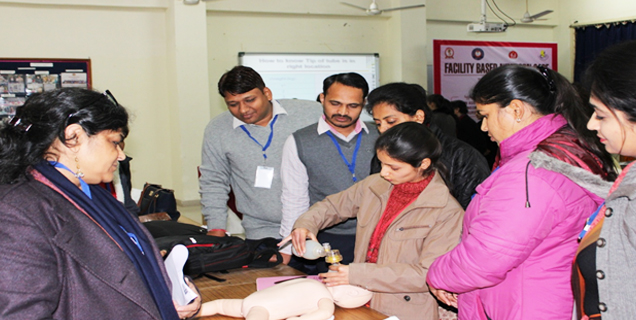
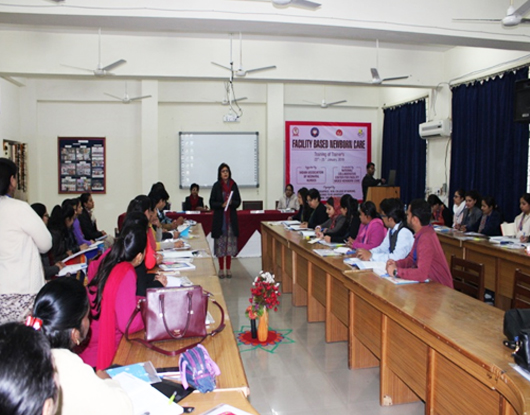
The master trainers were trained in standard treatment protocols for management of common newborn conditions at small hospitals. These protocols are flow chart based and available as a STP calendar and also as an android app developed by AIIMS WHO CC and downloadable form play store of any android phone. The teaching methodology included small group discussions, case scenarios, skill demonstrations, video podcasts on common equipment and OSCE using simulators, wall charts, and apps on tablets. The common conditions discussed were triaging, hypothermia, hyperthermia, feeding of LBW, post asphyxia management, hypoglycemia, shock, neonatal seizures, jaundice and discharge counselling. A glimpse of various equipment podcasts was also shown. The teaching was done by 5 facilitators to three groups of participants. The participants were given the STP calendar and also were guided to download the app on their mobile phones. The soft copy of calendars was shared with participants.